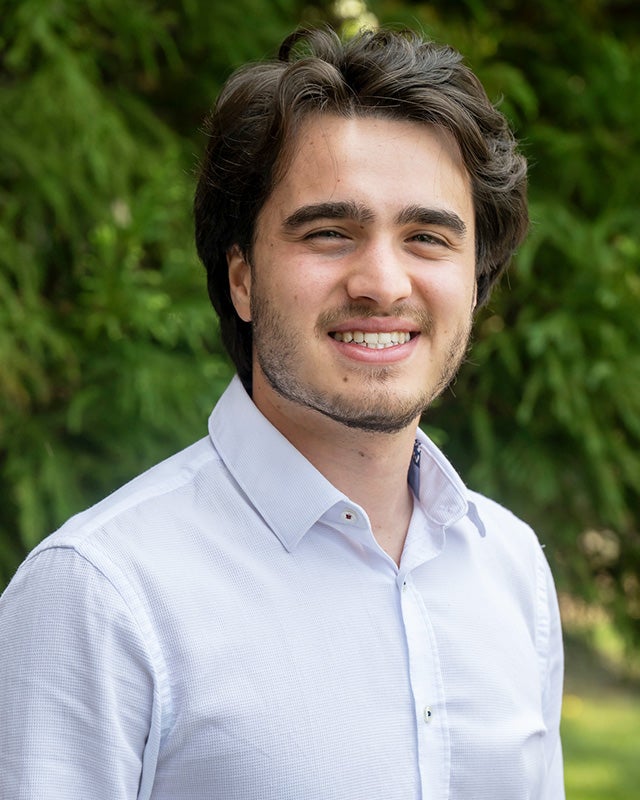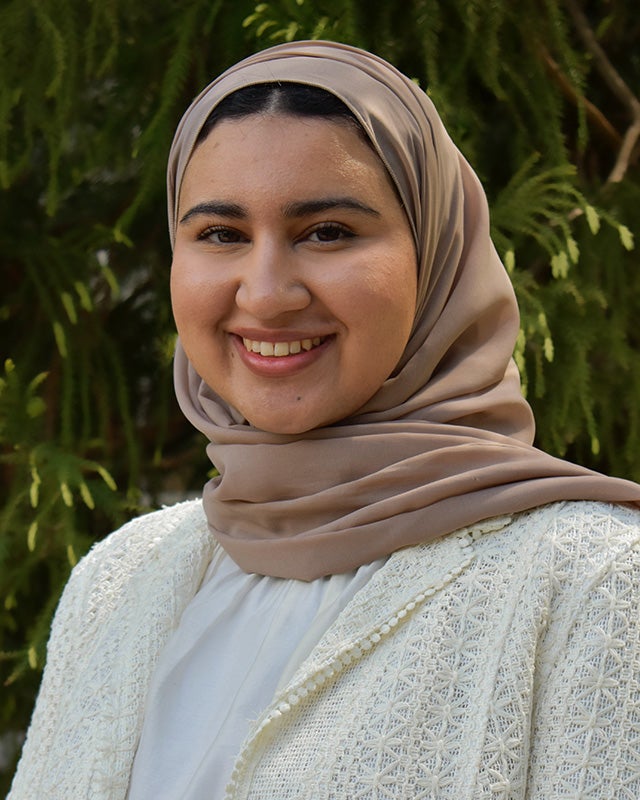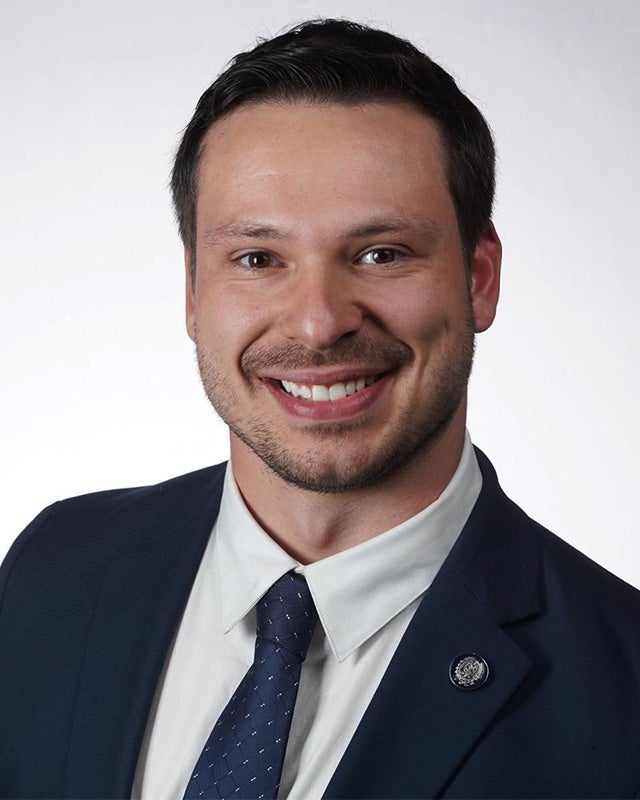Kickstarting Careers with Biotechnology Capstone Internships

Posted in GUMC Stories | Tagged biomedical education, Biomedical Graduate Education, biotechnology, experiential learning, graduate education, internships, student experience
(June 7, 2024) — At the heart of Georgetown’s one-year Master of Science in Biotechnology program lies its outstanding capstone internship program. During their spring semester, in addition to their coursework, students spend an average of 20 hours a week for 12 to 14 weeks working at national agencies, laboratories and leading biotechnology companies in the DC region such as AstraZeneca and Parexel, often taking the first step in their new careers.
Georgetown faculty have built an extensive network of possible employers for internships in the DC region. Many of the program’s own 1,200 alumni also now fill the management ranks of many of the labs and businesses where students intern.

“Georgetown has the oldest biotechnology master’s program in the country, with a tight-knit and established alumni network,” said Ivica Labuda, PhD, director of the biotechnology program and professor in the Department of Biochemistry and Molecular & Cellular Biology. Upon graduation 95% of biotechnology graduates are employed, with biopharma being the largest employer at 38%. The remaining 5% of the graduating class go on to pursue advanced degrees in doctoral programs and business and medical schools.
“There’s such a demand for students with a biotechnology background, from everything involved with vaccine development in labs to having people in agencies like the U.S. Food and Drug Administration who understand the underlying intellectual property applications for new medications,” Labuda said.
The range in career outcomes for graduates is reflected in the diversity of students selected for the program, as well as in the wide-ranging internship opportunities they pursue. Most students come to the program having previously studied biochemistry or engineering, but some have brought backgrounds in agricultural sciences and economics. After being accepted, students hone their knowledge with an intensive core curriculum, complemented by a choice of six tracks to focus their studies that range from Cell & Gene Therapy to BioBusiness.
The on-campus program is rigorous, requiring students to complete 30 credits over two semesters. Students prepare for their internship through their coursework, which includes courses offering an “introduction to the biotechnology industry” as well as those tailored to a specific biotechnology subject matter, such as lab methods or FDA case studies.
“Our classes meet every day until 8 p.m. and on some weekends,” said Labuda. Students reserve all-day Thursday and Friday of the spring semester for their capstone internships.
Future of Gene and Cell Therapy
After graduating from McGill University in 2023 with a Bachelor of Science degree, Taki Koudsi (G’24) was interested in a career in biotechnology following an internship with a medical center, where he learned about different gene therapies in which part of a person’s genetic material was removed or changed to possibly treat or prevent disease, especially cancer.

“After graduation, I was interested in technological improvements in immunotherapy using different types of cells to treat cancer cells in the body, and I found Georgetown’s biotechnology program, which seemed to align well with my interests,” said Koudsi.
Koudsi started the biotechnology program at Georgetown on the Cell & Gene Therapy Track in fall 2023, taking both science and business-related classes.
“I really enjoyed a class on DNA repair and damage, where we spoke with a lot of doctors about what is currently being researched,” said Koudsi. “I also took a class on how to manage biotechnology programs, which was more for a business management course that focused on how to do as much as possible efficiently.”
After just a semester at Georgetown taking classes and reaching out to possible businesses and organizations at which to intern, Koudsi started as a cell and gene therapy intern at Parexel, one of the largest clinical research organizations (CROs) in the world.
“I really like the concept of a CRO — you have the opportunity to interact with a lot of different companies working on different projects,” said Koudsi. CROs can offer a range of services to biotechnology and pharmaceutical companies, from preclinical research, trial management and drug commercialization.
“At Parexel, I work closely with the director and senior vice president of the cell and gene therapy department in preparing to meet with different companies about their current projects and needs,” said Koudsi. “It’s a bit surprising to learn what companies are focusing on and seeing all of the logistics that go into managing different projects.”
Koudsi has been working 20 hours a week for his internship while completing his courses and graduating in May. He’s interested in continuing to work for a CRO.
“There’s so much support from the biotechnology program in wanting students to succeed in finding an internship,” said Koudsi. “Plus there’s so many alumni to connect with to help find positions, not only for internships but also for a future job.”
An Amazing Research Experience
Maryam Al Zakwani (G’24) developed an interest in biotechnology while studying biology at the George Washington University.

“After graduating with my bachelor’s, I was thinking about applying to medical school but found the biotechnology program at Georgetown, which gave me the opportunity to explore biotech in a yearlong program,” said Al Zakwani.
Al Zakwani chose the BioScience Track and spent the fall 2023 semester taking biochemistry as well as courses focused on laboratory applications of biotechnology. “The first semester was intense and required a lot of juggling in terms of coursework and finding an internship for the spring,” said Al Zakwani.
For her internship, Al Zakwani worked with Kyle DiVito, PhD, assistant professor of biochemistry and molecular & cellular biology and associate director of the biotechnology program, and Naroa Gimenez, PhD, assistant professor in the biotechnology program, after hearing a presentation by Gimenez about her research developing 3D skin cultures.
“I didn’t get the opportunity to do this type of lab research in undergrad, so I really enjoyed the opportunity to see what a research position in a biotechnology lab entails,” said Al Zakwani. In the lab, Al Zakwani used mammalian skin cells to grow cell lines of the three different layers that compose human skin. After a two-week training session, she continued the research by herself, guided by her supervisors.
“We are trying to mimic human skin, which is incredibly difficult because the different skin types require different environments to survive,” said Al Zakwani. “Initially we thought we might not find a good environment to grow the skin cells altogether during the relatively short time of the internship, but I was lucky that we found a solution to support cell growth while I was there.”
Al Zakwani noted that the 3D skin cultures could give greater insight into how human skin could react with different applications, and that the technology could be used to replace animal testing with pharmaceutical products.
“The internship was such an amazing experience,” said Al Zakwani. She encourages future biotechnology students to explore the different research opportunities on Georgetown’s campus in addition to the internships in industry.
From Ice Hockey to BioBusiness
While studying molecular biology for his undergraduate degree, Nicholas Gravina (G’24) thought he would eventually go to medical school. As his senior year was coming to a close, he decided to pursue his other passion, ice hockey, and moved to Europe to play professionally.

When he returned stateside and retired his skates, Gravina still had an interest in medicine and started working for a small biotechnology company that studies the genetic sequencing of cancer cells.
After speaking with Labuda over Zoom while applying to programs, Gravina realized the Georgetown Biotechnology program, with its BioBusiness Track, was a great fit. After enrolling in fall 2023, Gravina immediately got involved with the biotechnology program’s student executive board and was elected co-president.
“The diversity of the students enrolled in the program really stood out to me,” Gravina said. “There are students not only from across the country but all over the world.”
Gravina described the curriculum as “extremely demanding,” recounting his first semester of classes including everything from biochemistry to intellectual property law. On top of his coursework and executive board duties, Gravina was also reaching out to different agencies and companies about a possible internship.
“After working in a lab, I realized that path wasn’t right for me and that I really enjoyed the business side of the industry, so I reached out to people who had connections with our program at AstraZeneca,” said Gravina, who started his portfolio management & governance internship with the company in December 2023.
For his internship, Gravina analyzes an internal data collection system that assembles different project information to help the company’s leaders make decisions.
“To make a decision, the person may need to know what trials the company is currently conducting as well as metrics related to the study in order to make efficient decisions,” said Gravina. “I’ve never been exposed to this kind of data and I’m so grateful for the experience, because it shows how decisions are made by distilling a large amount of information into digestible bits for decision-makers.”
Gravina will continue on at AstraZeneca post-graduation in the oncology commercialization leadership program. The three-year program provides associates the opportunity to rotate through different parts of the company, from the global operations department to the marketing department, to learn about different aspects of commercialization with hopes to develop into company leaders in the future.
“There’s so much opportunity with the biotechnology program, and the faculty really want you to succeed,” said Gravina. “I love just wearing my Georgetown sweater to work and meeting fellow alumni of the program and hearing what they are up to.”
Heather Wilpone-Welborn
GUMC Communications
